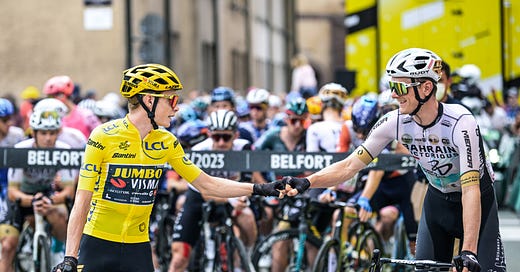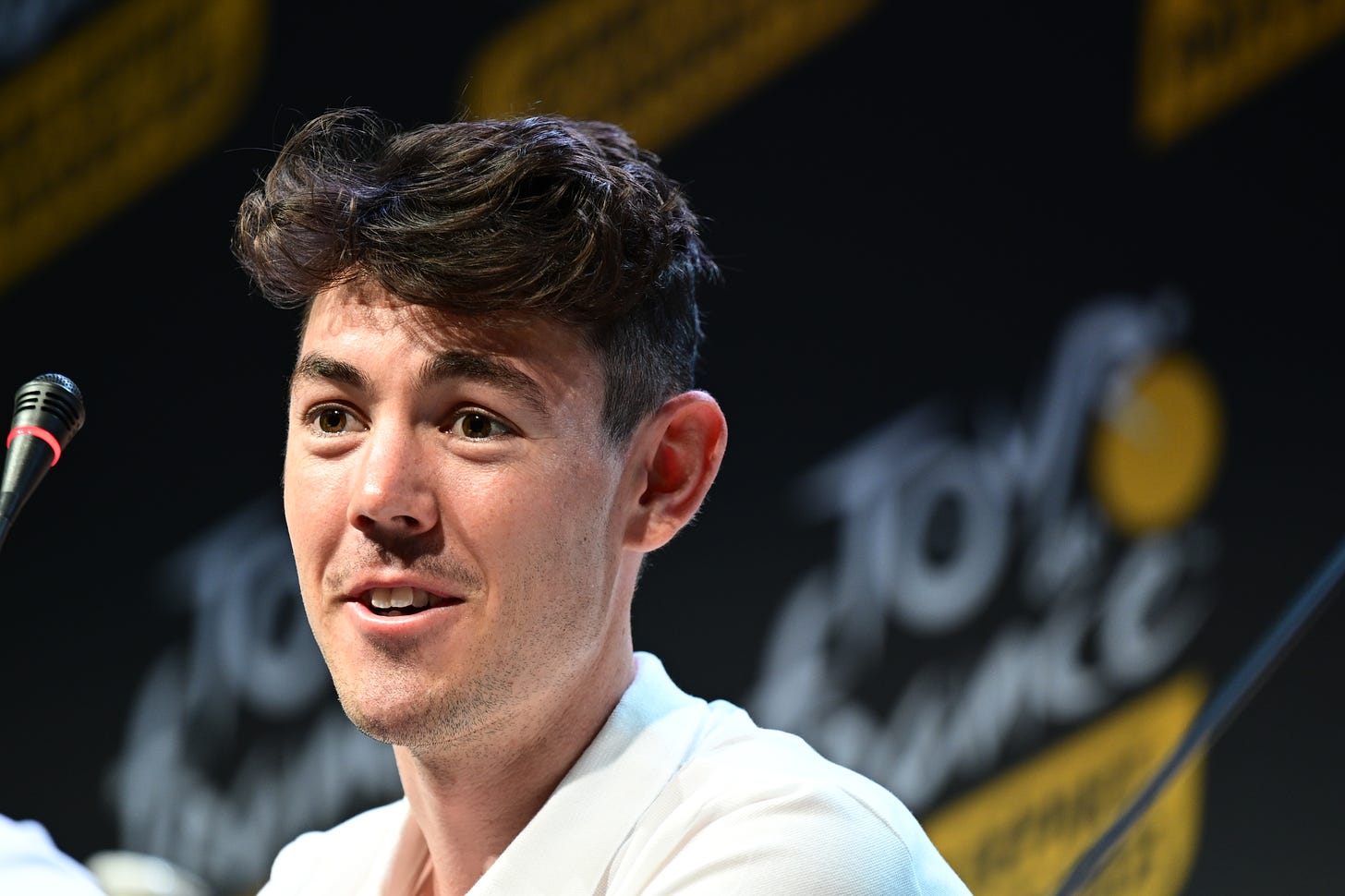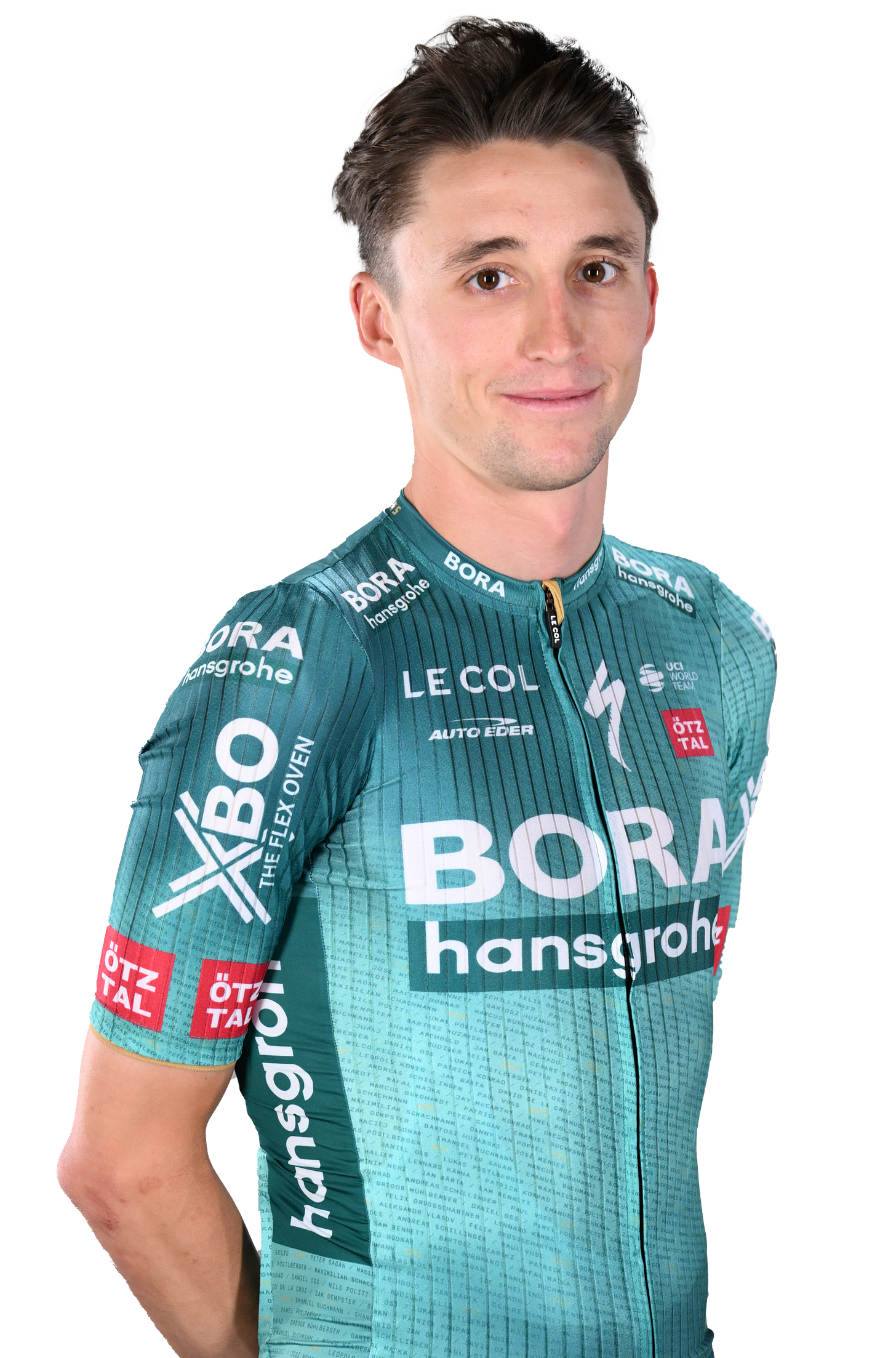These Guys Aren't Eating Enough Fiber
Reactions to the Tour de Suisse and the first five episodes of Pedal to Survive
I was mildly disappointed in the first season of Tour de France: Unchained, Netflix’s all-access Tour de France docuseries. From the same executive producer1 as the wildly successful Formula 1 series Drive to Survive, Unchained—which is a silly title; I’ve long maintained that they should’ve called it Pedal to Survive—gave us lots of great visuals in Season 1, as well as Wout van Aert being a little grumpy and Jonathan Vaughters talking a big game about taking a yellow jersey only to watch his team faceplant.
The big change this time around is the involvement of UAE Team Emirates, which sat out Season 1. Tadej Pogačar is a perfectly compelling silent offscreen antagonist, but he’s a magnetic televisual presence. Most athletes at his level2 either find the entertainment part of their sport to be an unnecessary distraction from winning, or they’re so beset on all sides they retreat into a trusted inner circle. Pogačar is so good—and he knows he’s so good—that he just doesn’t bother to hide or obfuscate in his interactions with the camera. He’s gonna be hot shit no matter how the docuseries makes him look, and he knows it, so why not have fun?
I’m only seen five of the eight episodes, on account of 1) having to watch baseball and 2) watching Unchained with my wife, which has given me an interesting perspective. Drive to Survive has lost its luster over the past couple seasons among diehards who find the series to be unnecessarily facile, or even dishonest. Even drivers have remarked on the show’s proclivity to use to selective editing to create the appearance of drama where none exists.
I obviously don’t approve of deceiving the audience,3 but any narrative that attempts to engage newcomers or casual fans is going to need to smooth over some details in order to make its subject legible to its audience. So from that perspective, even as someone who knows the story ends, it was better for me not to watch Unchained alone.
My wife is by no means a diehard cycling fan, but I’m here in large part because she woke up one morning and decided to read every book that had ever been written about the Lance Armstrong doping scandal, and encouraged me to do the same. So she’s not exactly coming in cold. But she has a keen eye for detail in sports generally, and asks interesting questions that I gloss over because I take them for granted.
So through five episodes, here are my thoughts on Season 2 of Unchained:
The most interesting running theme of this season, to me, has been watching different riders, with different personality types, deal with failure. There was Wout van Aert, who got ambushed by Victor Lafay in the last kilometer of Stage 2—a stage van Aert was sure to win otherwise. Van Aert stomps back to the team bus and yells some obscenities at nobody in particular. But by the time Jonas Vingegaard comes by to commiserate,4 van Aert has started too cool off.
Contrast that with how Tom Pidcock and especially Ben O’Connor dealt with the multi-day realization that their teams had to shift GC focus to Carlos Rodríguez and Felix Gall, respectively. Pidcock was pretty up front about how he deals with disappointment by going off and sulking by himself, though he was in denial for a couple days on the road and “imperiled”5 Rodríguez’s GC by disobeying team orders on Stage 13. O’Connor basically started the race in the midst of a full-blown temper tantrum and kept it going until the focus shifted away from AG2R.
One of my favorite scenes so far was the in-car shot of the AG2R DSs calmly expressing their frustration with O’Connor’s outburst. It was a wild departure from the crotch-grabbing ineptitude of the Movistar team car in The Least Expected Day. Someone’s clearly been to therapy.
Anyway, it’s perfectly acceptable to be angry, but mature adults don’t take their frustration out on others.
O’Connor’s implosion was a shame, because the Unchained crew had clearly bet big on the Drive to Survive playbook: Don’t let the Australian out of your sight. O’Connor will probably be unhappy with how he comes off, but not everyone can be Daniel Ricciardo.
One question my wife asked was how much these guys eat in order to keep moving. I didn’t have a calorie count off the top of my head, so I found the answer in a Cycling Weekly article—9,000 calories on climbing stages—that features the following quote from a World Tour nutritionist: “If it’s a mountain stage, we will go rich in carbohydrates because that’s your fuel for climbing, but we also make sure the food is low in fiber because you don’t want the food to cause any fluid retention.”
My point is this: I think everyone—especially Ben O’Connor—is cranky because they’re not eating enough fiber.
The death of Gino Mäder at last year’s Tour de Suisse hangs over the whole season so far. It’s a tough subject for a sometimes-sensationalistic documentary to tackle; you don’t want to gloss over it or miss a genuine moment of emotion, but you also don’t want to come off as voyeuristic or prurient. I think Unchained dealt with the topic pretty tastefully, letting Mäder’s teammates and friends, especially O’Connor, say their piece about an extremely talented—and apparently well-liked—rider.
Another one of my wife’s insights: Pogačar looks like a child. I said the same about O’Connor, though she says it’s mostly that he has a little kid’s haircut.
I don’t know how explain this, but Jai Hindley looks like a baseball player.
Obviously he’s like 100 pounds too light, and baseball players don’t talk with a Western Australia accent,6 but if you put Hindley on a 6-foot-4-inch body and taught him a Tampa accent he’d look right at home in a major league clubhouse.
Last season’s EF episode was about Jonathan Vaughters talking up Sefan Bissegger’s chances at winning the opening time trial and wearing the yellow jersey, only for Bissegger to wipe out on the opening stage, leaving Vaughters with egg on his face. And they went back to the well this year, with Vaughters talking up Richard Carapaz as the only rider capable of breaking the Vingegaard-Pogačar duopoly. Carapaz fractured his kneecap on the first day of the race and abandoned. I’m terrified of who Vaughters might jinx next year.
The on-bike camera shots during the finale of sprint stages is absolutely killer. I think cycling suffers a little as a TV spectacle because you really don’t get a sense of how fast these guys are going and how perilous their grip on the road is. Getting right in the thick of things eliminates all doubt. And it’s not just in sprints; there were some great shots of descents as well.
Episode 5 also featured a shot where Pogačar gets stuck behind the motorbike while attacking on Col de Joux Plane that illustrates just how fucking fast these guys can go up a steep incline.
It’s very funny to me how all these pro athletes in their mid-20s are either married with kids or have steady long-term girlfriends. Nobody gets married that fast outside of Liberty grads. Though I guess cycling is the opposite of your typical athlete life, where the stability of a stable monogamous relationship offsets the drudgery and loneliness that comes with spending 40 hours a week on a bike. Plus, unless you’re from, like Andorra, you have to move to a foreign country to live and train. You have to watch what you eat and drink, and even how much you stand. I bet that makes it hard to meet people.
I’m having fun. It’s not particularly revelatory or life-changing, but it’s a good watch if you know the players and a great entry point if you don’t. I know the episodes on Pogačar cracking and Matej Mohorič crying during his post-stage-win interview are still to come. So if the first five episodes are good, the last three must be dynamite.
A quick thought about the business end of the Tour de Suisse, which is this weekend. We’ve got a snow-shortened Stage 6 on Friday, which will be in progress when this goes out7, followed by another medium-mountain stage on Saturday and a climactic mountain time trial on Sunday.
Adam Yates put time into his rivals in summit-finish stages on both Wednesday and Thursday. Right now only João Almeida, his teammate, is within a minute on GC. Barring some catastrophic breakdown, I doubt Almeida will attack his leader, but that time trial finale could be pretty juicy. It’s only 16 kilometers, but the last two-thirds of it are an 8 percent climb. That’ll elongate the stage, but it’ll also blunt Almeida’s advantage over Yates against the clock. Even so, the idea of a teammate-against-teammate time trial for the GC is exciting.
Almeida has been the next big thing for a while now, but his only World Tour GC win came at the Tour of Poland three years ago. Winning the Tour de Suisse would be a major feather in his cap, and give UAE a record of five stage races won this year by five different riders.8
Also, Egan Bernal is in third place! It’d be Bernal’s second podium in a World Tour race this year, which represents a major step forward from being lost in the wilderness for two seasons after his crash. Fingers crossed that he holds on.
Occasional Asif Kapadia collaborator James Gay-Rees, who is neither Tory Slenderman Jacob Rees-Mogg nor Welsh rugby union star-turned Kansas City Chiefs running back Louis Rees-Zammit
And these are few
I still giggle to myself about the time when Will Buxton looked straight into the camera and said embattled Alfa Romeo driver Antonio Giovinazzi was “wicked quick”
And even to apologize for failing to close Lafay’s attack down, which 1) is not his job and 2) is a bit ostentatious. Maybe someone gave him notes about how Season 1 looked.
Rodríguez lost all of 17 seconds to Pidders dropped him, though the edit made it look like minutes.
In general. I’ve interviewed the Australian big leaguer Liam Hendriks before, and he’s a delightful man.
I saw 42.5 km on PCS and my brain went immediately to time trial
Pogačar (Giro d’Italia), Juan Ayuso (Itzulia Basque Country), Yates (Tour of Oman), Brandon McNulty (Volta a la Comunitat Valenciana)







